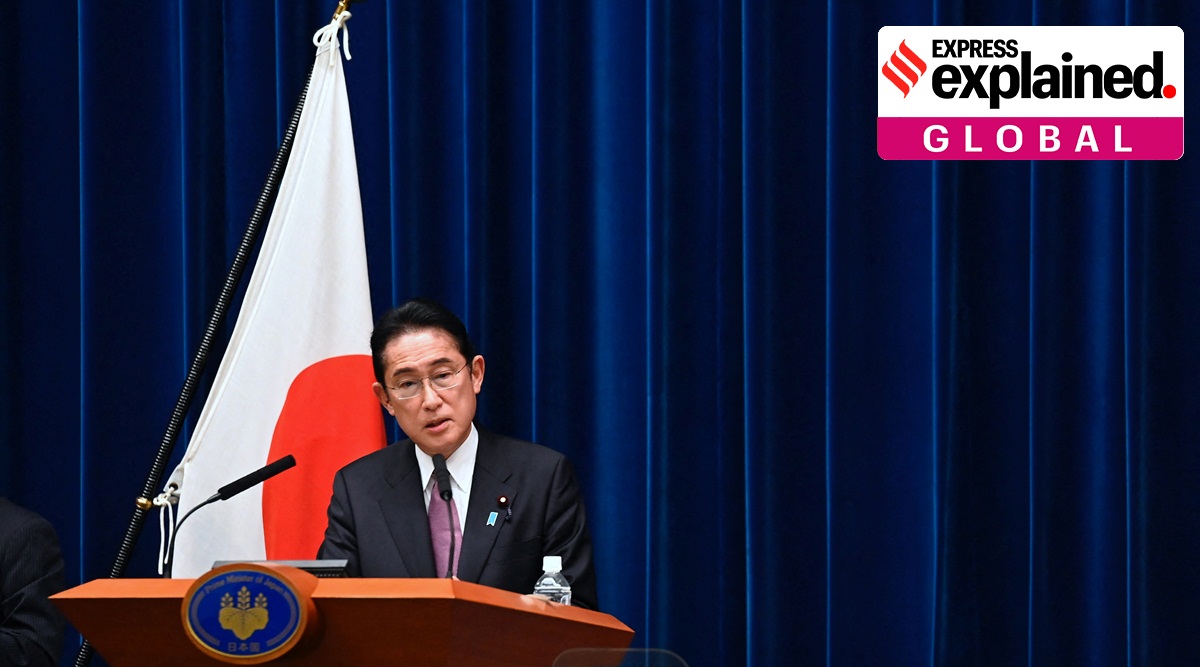$320-billion military build-up: Why Japan is scrapping its pacifist defence strategy
Based on current budgets, this five-year plan will make Japan the world's third-biggest military spender after the United States and China. What explains the policy shift mean for the region at large? We explain.
 Japan's Prime Minister Fumio Kishida attends a press conference in Tokyo, Japan, on December 16, 2022. (David Mareuil/Pool via REUTERS)
Japan's Prime Minister Fumio Kishida attends a press conference in Tokyo, Japan, on December 16, 2022. (David Mareuil/Pool via REUTERS) In a significant shift from its long-time post-war pacifist approach, on Friday, Japan announced a $320 billion plan for a military build-up, the biggest since the Second World War.
Based on current budgets, this five-year plan will make the country the world’s third-biggest military spender after the United States and China, a Reuters report said. On December 16, Prime Minister Kishida Fumio’s cabinet approved Japan’s three key security documents.
Preparing for UPSC? Use CRACKUPSC20 code here to get an extra 20% discount on Indian Express subscription.
“Each and every one of us must have the awareness that we are protecting our country. This is very important, as we have learned from Ukraine,” Prime Minister Kishida said in a news conference. “We are now at a turning point of our national security policy,” a Washington Post report quoted him saying.
Why is Japan undertaking a build-up of its military?
Analysts believe that Tokyo may be concerned about potential regional threats. A catalyst for this stance may be Russia’s invasion of Ukraine that occurred in 2021, and China’s aggression, which indicated that the world may be looking at the possibility of China’s takeover of Taiwan in the future.
Then there are other concerns that Tokyo may be grappling with, including the possibility of China attempting to wrestle for control of the uninhabited Senkaku Islands, regarding which it is engaged in a territorial dispute with Japan.
What does this mean for the region?
There are several reasons why Japan’s new defence strategy is important. Under the country’s post-war constitution, Japan is not allowed to have offensive military forces and Article 9 of the constitution says “the Japanese people forever renounce war as a sovereign right of the nation and the threat or use of force as means of settling international disputes”.
But the situation is a bit more complex: After the end of the Cold War, Japan has been consistently amending its security policy to increase its capabilities to defend itself outside its own territories, and has been developing itself to be equipped to send its forces overseas when required.
According to a 2012 report by the International Institute for Strategic Studies, Japan has the world’s sixth-best funded defence forces. But Japan’s new strategy documents unveiled last week show that the country believes that its current defence capabilities are insufficient given the rapidly changing global scenario.
According to a Washington Post report, “Japan aims to improve its long-range strike capability with both Japan-made long-range weapons and imported foreign ones, such as U.S.-built Tomahawk cruise missiles.
Japan’s defence policy will remain defence-oriented, and counterstrikes will only be used under certain limited conditions, according to the documents. The new strategy does not allow for preemptive strikes.”
A Reuters report pointed to a separate national security strategy document referencing China, Russia and North Korea as countries that pose security concerns for Japan, which indicated plans for close cooperation with the United States and other like-minded nations, particularly those in the Indo-Pacific, “to deter threats to the established international order.”
The criticism
While Japan’s allies, specifically the US, have welcomed this development, some of Japan’s neighbours are not happy. “The Prime Minister is making a clear, unambiguous strategic statement about Japan’s role as a security provider in the Indo-Pacific,” US Ambassador to Japan Rahm Emanuel said in a statement. “He has put a capital “D” next to Japan’s deterrence,” he added, according to a Reuters report.
According to a Guardian report, this week, China’s foreign ministry spokesperson Wang Wenbin urged Japan to “act upon the political consensus that the two countries are cooperative partners and do not pose a threat to each other”.
There is also some indication that domestically, in Japan, the country’s citizens have differing views. “While Japanese voters have traditionally been sceptical about direct revision of the constitution, public support for a more robust military has grown since the Ukraine war and amid fears that a Chinese invasion of Taiwan could pose a threat to Japan’s security,” a Guardian report said.
- 01
- 02
- 03
- 04
- 05






































